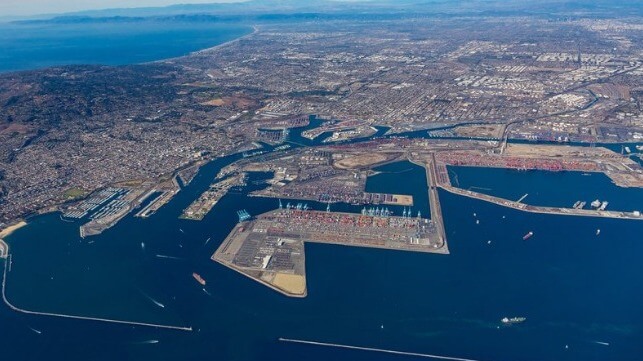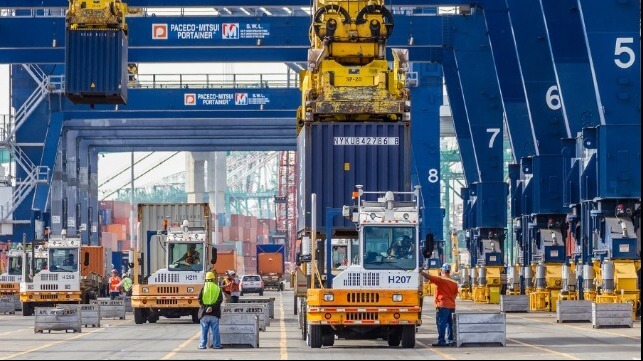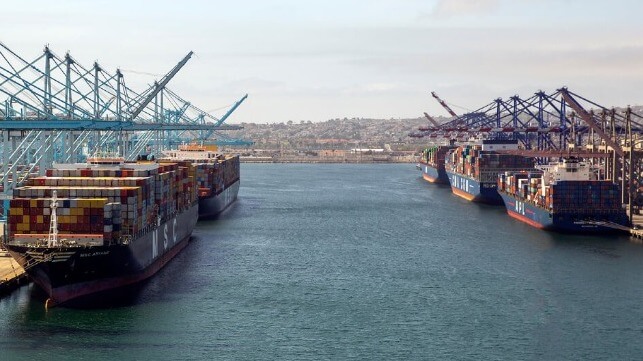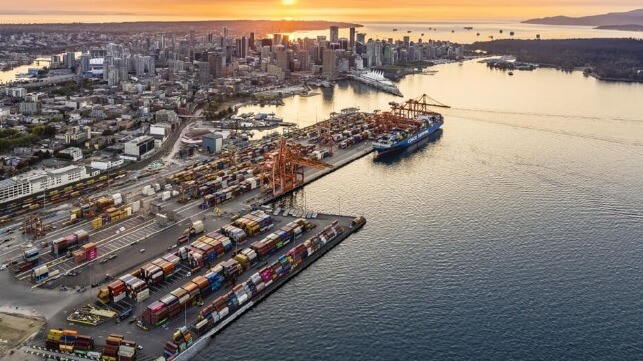Ports Work to Recover as ILWU Says Ratification Process Will Begin

Ports and terminals along the U.S. West Coast are working to catch up and clear out any backlogs that developed due to the labor shortage of the past days now that the Pacific Maritime Association and International Longshore and Warehouse Union reported a tentative agreement after 13 months of negotiations. News of the agreement was welcomed widely within the port and shipping communities while the union noted that the ratification process would take a few months to complete.
“While the final decision is up to our members, we feel our time at the bargaining table was well spent and that the agreement represents the hard work of our rank and file and the sacrifices they made during the pandemic,” said ILWU President Willie Adams in a statement.
Both the ILWU and the PMA are declining to make any official comments on the terms of the agreement other than it is for six years. “We will not be sharing details of the tentative agreement publicly until we have completed the ratification process,” said Adams.
People familiar with the negotiations told The Wall Street Journal that the new contract calls for increasing longshore workers' pay by a third over the six years of the contract and would be retroactive to the expiration of the prior contract on July 1, 2022. They are reporting that basic pay would be increased by 10 percent in the first year from last year’s $46.23 per hour to just over $50 per hour. In addition, there will be a total of $70 million for a one-time “hero bonus” to be split among the workers in recognition of their efforts to keep the supply chain moving during the pandemic. No details are being reported on the more contentious issues such as automation.
There was universal relief that the agreement had been reached with many organizations issuing statements welcoming the news. President Joe Biden congratulated both sides and thanked Acting Labor Secretary Julie Su for her role in bringing the negotiations to an agreement. The White House privately hopes her visible role will help complete what has turned into a contentious confirmation process for the secretary.
“This is great news for the West Coast ports and the supply chain all across America. The contract agreement will have a hugely beneficial impact to the U.S. economy, which depends on our ports and the trade they facilitate,” said the Port of Long Beach. Gene Seroka, Executive Director of the Port of Los Angeles highlighted that the agreement “brings the stability and confidence that customers have been seeking.”
The ILWU noted that the ratification procedures start with a contract caucus that convenes delegates from the union’s 29 locals up and down the West Coast. These delegates will carefully review the tentative agreement and make a recommendation to the rank and file who will then vote on the tentative agreement.
“We urge the parties to quickly ratify the tentative agreement to bring certainty back to the West Coast ports,” said Matthew Shay, President and CEO of the National Retail Federation. He added in, “It is essential to begin the negotiation process early for the next labor contract and avoid a future lapse in continuity.”
As of the end of the day on Thursday, the Marine Exchange of Southern California however was saying the situation in the ports remained fluid. During the day on Thursday, they said two vessels in port had rescheduled their departures with the CMA CGM Laperouse delaying 14 hours due to labor. Four other containerships in port had previously delayed their scheduled departure times. Two other delayed vessels however departed on Thursday. Three inbound vessels also reported delays but Captain Kip Louttit, Executive Director of the Marine Exchange of Southern California, was hopeful that there would no longer be a need for special reporting and that port operations would quickly return to normal.
Tentative Labor Agreement for U.S. West Coast Ports

The Pacific Maritime Association and the International Longshore and Warehouse Union announced late on Wednesday, June 14, that a tentative agreement has been reached a year after the prior labor contract expired and after weeks of sporadic labor shortages that were causing disruptions and delays at the U.S. West Coast ports. The tentative agreement, which was reached with the assistance of Acting U.S. Secretary of Labor Julie Su, brings to close 13 months of negotiations providing for a new six-year contract that covers all 29 West Coast ports.
The association representing the employers and the union released a brief statement saying they were pleased to have an agreement so that they can “turn our full attention back to the operation” of the ports. They did not announce the terms of the agreement noting that it still requires ratification by both sides.
The White House sent Acting Secretary Su to San Francisco on Monday, June 12 to meet with both the union and employers’ association. They highlighted her experience having previously been Secretary of the California Labor and Workforce Development Agency from 2019 to 2021 and having previously dealt with both sides of the current negotiations. The Labor Department released a brief statement with Su thanking both sides for their hard work and perseverance saying it “demonstrates once again that collective bargaining – though sometimes difficult – works.”
Reports said that the talks had broken down at the beginning of June as they approached the final issue of wage increases. Su helped to bring both sides back to the negotiations with reports late on Monday that they had agreed to a cooling-off period to stop the labor shortages. The PMA was accusing the union of withholding the dispatching of daily workers.
While the ports of Los Angeles and Long Beach during their monthly updates at the beginning of the week insisted they were open and volume moving, there were growing reports of delays. The Port of Seattle had been forced to suspend container operations last weekend while the Port of Oakland, California had earlier in June also been forced to close and some terminals in both San Pedro Bay ports had periodically suspended operations or closed their trucking gates.
The Marine Exchange of Southern California reported on Wednesday that four vessels rescheduled arrivals with agents for two attributing it to labor issues. Eight vessels in port they said had also reported schedule delays, but four other vessels departed on June 14. Other reports indicated that dwell times were increasing at the West Coast ports.
The Executive Director of the Port of Los Angeles, Gene Seroka, Tweeted a message hailing the agreement which he had repeatedly said was urgent to shippers and managing port volume. He noted the agreement provides “stability and confidence,” while noting the challenge would now be to attract volumes back to the West Coast after shippers and carriers diverted containers to the U.S. Gulf Coast or East Coast ports.
Earlier in the week, Seroka noted the port was operating at only 70 percent of capacity with volumes down approximately 20 percent in May versus the year earlier. While highlighting that volume had increased for three months in a row at the Port of Los Angeles, he estimated as much as 15 percent of the port’s volume had been diverted to other ports due to the uncertainty during the 13 months of negotiations.
The agreement comes at an important time as the U.S. economy appears to be rebounding and retailers were indicating their plans to begin to again increase imports to build inventories after months of slowed activity. Retailers are preparing for the busy selling seasons in the third and fourth quarters of the year.
It also provides greater stability to the transpacific trade which is also facing the prospects of an ILWU strike in Canada at the end of June which would impact the key ports of Vancouver and Prince Rupert. The Canadian ports in addition to handling a significant part of Canada’s trade also move containers for U.S. manufacturers, especially in the Midwest. Members of the ILWU of Canada in a nearly unanimous vote authorized a possible strike which could start as early as June 24 if they can not reach an agreement on their contract which expired on March 31.
Port of LA Calls Disruptions “Minimal” as Labor Secretary Enters Talks

The Port of Los Angeles sought to downplay reports of disruptions in its monthly update saying operations are mostly normal and while experiencing sporadic labor shortages that the impact was “minimal” so far. They also highlighted that the Biden administration has quietly increased its efforts, speaking with both sides of the current contract negotiations, seeking to ensure the talks are moving forward with reports of a possible "cooling-off" period.
Speaking to the media, Gene Seroka, Executive Director of the Port of Los Angeles said, “We have been able to function close to normal since June 1,” while also admitting during the briefing that the port is currently operated at about 70 percent of full capacity. With volumes down due to the economy, Seroka points to the number of vessels on dock, dwell time for containers at the port, and the number of boxes at the terminals “ready to go,” saying that all three indicators remain largely stable. He called much of the rhetoric an expression of “frustration” from both sides that the talks have taken 13 months.
The port repeated its calls for the urgency to have an agreement in the labor talks to maintain what it sees as a building recovery from the low point in volumes in February 2023. Seroka confirmed the other reports that Acting Labor Secretary Julie Su flew to San Francisco and has met with both the Pacific Maritime Association and the International Longshore Workers Union and remains in the city to collaborate with both sides of the negotiations. Seroka called the labor negotiations “a top priority for the Biden Administration.” Unconfirmed reports in the media are saying that two sides agreed to a cooling-off period proposed by Su while the PMA and ILWU have also overcome some sticking points in the talks.
While port officials are seeking to downplay the disruptions, the Marine Exchange of Southern California issued an update late on Tuesday saying that 11 ships have now delayed their arrival times with agents telling them it is due to labor shortages. The delays are ranging between a few hours to one or two days.
“Even with improving volume, our terminals are a long way from working at full capacity,” Seroka however admitted during the media briefing. May’s volume was down nearly 20 percent on imports, exports, and empties moved versus a year ago and about six percent below the port’s five-year rolling average. Similarly, for the first five months of 2023, the Port of Los Angeles is 15 percent behind the five-year average. Despite that, they highlighted volumes are up 60 percent since the low in February this year.
“We’re starting to see more vessels headed across the Pacific to Los Angeles, an encouraging sign for the second half of the year,” Seroka highlights. Saying that if the labor contract is finalized and the economy continues to build in the U.S., he expects “a strong back half of the year.”
The Port of Los Angeles is forecasting even with the current uncertainties that June will see between 700,000 and 750,000 TEU which would be down from the 779,140 TEU handled in May.
Among the positive signs he 58 vessels en route to Los Angeles, up from 47 and 46 one and two months ago, and indications that retailers are beginning to increase inventories. However, the Port of Los Angeles estimates 15 percent of its volume shifted east to other ports in the past year due to labor uncertainties and notes it will take months to attract shippers and carriers to build back volumes to the port.
Canadian ILWU Authorizes Potential West Coast Port Strike

In a nearly unanimous vote, the members of the International Longshore and Warehouse Union of Canada gave their leaders a mandate to call a strike if necessary in their ongoing contract negotiations. The potential of a strike that would impact Canada’s West Coast ports including Vancouver and Prince Rupert raised the further prospects of disruptions not only to the flow of commerce in Canada but also to the U.S. as disruptions are building in the U.S. West Coast ports.
The ILWU concluded two days of voting held on June 9 and 10 reporting yesterday to members that 99.24 percent have voted in favor of supporting a potential strike if necessary against the member companies of the BC Maritime Employers Association (BCMEA). The union represents more than 7,000 dock workers at Canada’s West Coast terminals operated by the 49 member companies of BCMEA.
Officials pointed out that talks are continuing between the two sides during a 21-day cooling off period imposed under Canadian labor law. Both sides have agreed not to take any actions before June 21 and then the union would be required to make a 72-hour advance notice of any planned action. The earliest a strike could happen is June 24.
It is the latest step in the dispute that began even before the contract expired on March 31. Talks had been expected to start in January but were delayed till February. Weeks later, even before the expiration, the ILWU filed for federal government mediation saying there was no progress. The mediation ran from March 28 to May 30 and is followed by the mandated cooling-off period.
“We want to avoid another disruption that risks fueling inflation and higher prices for consumers and businesses so soon after the devastation inflicted by the COVID-19 pandemic, heat domes, and catastrophic flooding,” said Bridgitte Anderson, President and CEO of the Greater Vancouver Board of Trade. The non-profit group which represents Canadian businesses warns a disruption in port operations would severely impact manufacturing, retail, agriculture, critical minerals, automotive dealers, and energy industries across the country.
The group highlights that a sixth of Canada’s international trade, approximately US$260 billion, moves through the ports of Vancouver and Prince Rupert annually. The two ports are the primary container terminals for Canada in its trade with Asia moving everything from electronics to apparel as well as exports. Vancouver handles approximately 4 million TEU annually while Prince Rupert has an annual capacity of 1.35 million TEU.
While the majority of the container volume is destined for Canadian businesses, estimates highlight that between 10 and 15 percent of the overall volume is being shipped to the U.S. via rail links primarily into the Midwest. They warn that the U.S. auto industry as well as manufacturers would also be impacted by a job action in the two Canadian ports. With growing disruption in the U.S. ports, and especially neighboring Seattle, the Canadian ports could serve as an alternative if shippers further seek to diver volumes away from the U.S.
No comments:
Post a Comment